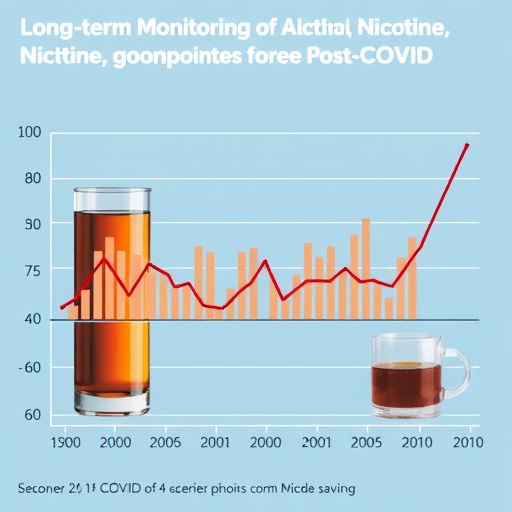In a groundbreaking study titled “Long-term WBE monitoring of alcohol, nicotine, and caffeine in two Spanish cities: COVID-19 impacts and beyond,” researchers have undertaken an unprecedented examination of the wastewater-based epidemiology (WBE) related to the consumption of alcohol, nicotine, and caffeine over an extended period. This study, which is likely to stir considerable interest within the scientific community and beyond, was spearheaded by notable scholars including Melones-Peña, Pérez, Pardo, and others. Their findings, set to be published in the Environmental Science and Pollution Research journal in 2025, carry profound implications for public health monitoring and urban sociocultural dynamics.
The essence of wastewater-based epidemiology lies in its ability to provide real-time insights into the patterns of substance use within a population. Through the analysis of wastewater, researchers can gather valuable data regarding the prevalence of certain behaviors that may not be readily accessible through traditional means of survey-based research. This has become particularly relevant in the wake of recent global events, wherein the dynamics of substance use have shifted dramatically due to restrictive measures during the COVID-19 pandemic.
In cities across Spain, the research team meticulously collected wastewater samples over an extended timeframe, analyzing their concentrations of alcohol, nicotine, and caffeine. This data served to highlight not only the average levels of consumption but also the fluctuations that occurred in direct response to various societal and environmental factors. The collected samples represented a vast population, making the findings statistically significant and representative of broad societal trends.
The implications of this research extend far beyond simple monitoring. As urban areas grapple with burgeoning issues such as substance abuse, policy-makers and public health officials can utilize such data to inform intervention strategies. Understanding the trends in usage across demographics and timeframes empowers communities to allocate resources effectively for addiction treatment, public awareness campaigns, and future planning regarding public health infrastructure.
Research on waste products has begun to shed light on how alcohol, nicotine, and caffeine consumption reflects the societal psyche. The authors suggest that the data not only reveals consumption patterns but also serves as a canvas depicting the behavioral shifts in society due to intense stressors, such as the pandemic. For instance, as lockdowns were enacted, the data may illustrate significant drops in alcohol and caffeine consumption during strict regulations, signifying a shift in lifestyle and coping mechanisms.
Furthermore, the findings show that as restrictions eased, there was a notable rebound in the consumption of these substances, hinting at potential societal attempts to return to pre-pandemic normalcy. This research opens new doors for exploring correlations between societal events and substance usage trends, thus contributing to a holistic understanding of human behavior in crisis and recovery.
The study also highlights the importance of continuous monitoring. The authors advocate for routine WBE studies to be integrated into public health frameworks. With a wealth of data available, relevant stakeholders can keep a pulse on the wellbeing of communities. Such regular analysis would not only help address immediate public health challenges but also serve to track long-term behavioral trends that could guide preventive measures.
As scientific discourse around mental health and substance use continues to gain traction, this research paves the way for interdisciplinary collaboration. Experts in psychology, sociology, urban planning, and environmental science can converge through the lens of WBE to craft multifaceted solutions that consider the intricacies of human behavior influenced by both individual and societal factors.
In a world increasingly driven by data, the necessity for responsible and informed policy-making cannot be overstated. The authors emphasize that transparent communications of this information to the public can foster a greater understanding of the impacts of substance use and lay the groundwork for community-driven solutions. The transparency surrounding data from sources like WBE could bridge the gap between scientific research and public understanding, empowering individuals with the knowledge required to make informed decisions.
Overall, this ambitious study stands as a testament to the evolving capabilities of modern epidemiology and environmental monitoring. The long-term WBE approach to assessing alcohol, nicotine, and caffeine consumption will not only deepen the comprehension of urban health landscapes but also foster resilience in the face of future challenges. As scientists unravel the intricate web connecting behavior, environment, and health, communities will be better equipped to address the emerging realities of a post-pandemic world.
Such research is crucial not only for immediate public health concerns but also for shaping long-term behavioral strategies. It presents an opportunity to refine the understanding of substance use and encourages cross-sector collaboration toward holistic solutions. As the scientific community awaits the official publication of these impressive findings in 2025, the anticipation builds for a deeper conversation around the interplay of environmental monitoring and public health.
The study epitomizes a progressive approach to science, demonstrating how modern technologies can unearth critical insights into societal behaviors, leading to informed decision-making and impactful policy changes. Future research endeavors may build upon this foundation, exploring the correlations between environmental factors and behavioral trends, thus enriching the dialogue around public health and community resilience.
Subject of Research: Wastewater-Based Epidemiology (WBE) Monitoring of Alcohol, Nicotine, and Caffeine Consumption
Article Title: Long-term WBE monitoring of alcohol, nicotine, and caffeine in two Spanish cities: COVID-19 impacts and beyond
Article References:
Melones-Peña, N., Pérez, T., Pardo, M.C. et al. Long-term WBE monitoring of alcohol, nicotine, and caffeine in two Spanish cities: COVID-19 impacts and beyond.
Environ Sci Pollut Res (2025). https://doi.org/10.1007/s11356-025-37060-5
Image Credits: AI Generated
DOI: https://doi.org/10.1007/s11356-025-37060-5
Keywords: Wastewater-based epidemiology, alcohol consumption, nicotine monitoring, caffeine usage, COVID-19 impacts, public health, behavior analysis, environmental science.




